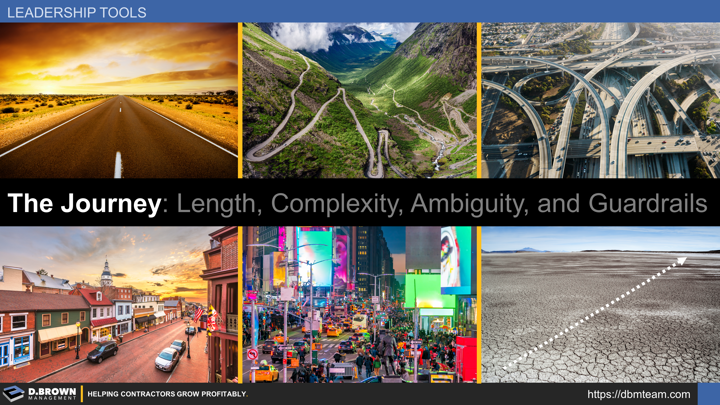Imagine job roles and the people in them as navigating journeys of different lengths, complexities, and ambiguity with varying degrees of guardrails in place to keep them on track.
Driving to a destination 10 miles away along a straight 2-lane road is much easier than navigating 100 miles along a windy mountain road. That is far easier than navigating a busy freeway system in a city you've never been in before.
- Having a map helps with all three, especially the latter two.
- Having a passenger who's traveled the road before will help.
- Having a GPS that will provide you turn-by-turn instructions including recovery instructions if you get off the path allows nearly anyone who can drive to navigate all three if given a destination address.
Consider the difference between walking down Main Street in any given small town looking for the basics like a store, which is relatively easy to find. Now consider the complexity of being dropped into a busy downtown city and having to navigate the streets and transportation systems. Both similar but dramatically different skills and risks. You likely wouldn't send your 12-year-old out alone in a big city to buy a candy bar at a local shop but would likely do it in any given small town.
Now consider the most ambiguous example of having to look out into a vast piece of undeveloped land, select a location for a city and then build that city with all associated infrastructure. There are companies like Bechtel that have been tasked with and successfully delivered such projects.
All contractors and the role within them fall somewhere along this curve from very straight forward with clear guardrails through to nearly a blank sheet of paper with only a vague vision and the broadest of guardrails.
The magic of building a business is to provide clarity in the job roles that both fit the business model and can be comfortably executed by the range of people who would be applying for those roles.
With scale, building tools like the GPS system will help a wider range of people do a particular role, and do it more effectively. This is one method of mitigating the talent shortage.
Guardrails are in place to keep people safe. In the analogies above, these can be as simple as speed limits and physical guardrails that are in place to keep a vehicle from falling off the edge of a mountain or elevated freeway. These guardrails protect all parties. There is no need for guardrails in all locations - for example, on the straight road through flat land. It is obvious enough if someone drives off the road.
When it comes to building capabilities and confidence, think about raising kids. Start to stretch them by letting them walk down Main Street to buy their own stuff at a store or go explore within a few blocks. When teaching them to drive, don't start with the windy mountain road or complex freeway system. As they build capabilities and confidence, then you stretch them a little more.
Building a team and a company is no different.
- When you line up all your job descriptions, can you see these different elements?
- Is there clarity in the progressive nature of each of these elements at each level of your org chart?

